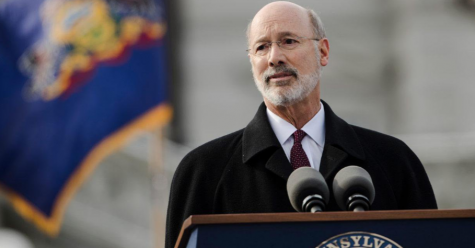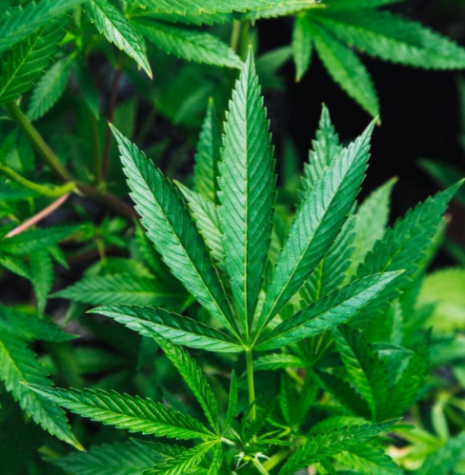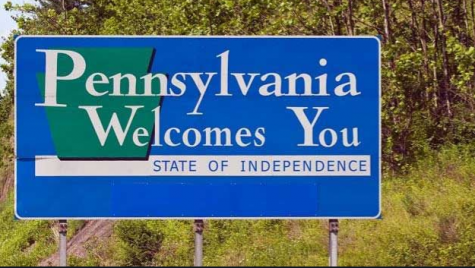Mary Jane is on Your Doorstep, Pennsylvania
April 2, 2019
Get this: You are walking down the street smelling the tingling scent of natural stimulants as people eat crackers, talk about the deeper meanings of life and give credit to the infamous drug nicknamed “weed.”
Cannabis can be used medically for physical and mental illnesses, which is where the debate over recreational and medical use of marijuana comes into play.
Weed, also known as marijuana, is the dried leaves, flowers, seeds and/or stems from the Cannabis sativa or Cannabis indica plant.
The drug, which can be manipulated into “blunts” or other forms like edible sweets, is often used to induce a state of relaxation or experience a hyper state of mind; both are argued to have the ability to create a personal atmosphere for the user that induces an “open state of mind.”
Indica is often noted to induce deep body relaxation, while Sativa strains are known to provide a higher energy level.
Here are the arguments behind the debate on weed in Pennsylvania.
Currently, Pennsylvania is one of the many states considering the legality of recreational marijuana.

Being the “most commonly used illicit drug in the United States,” according to the National Institute on Drug Abuse, marijuana is traded, smuggled and snuck into every corner of the nation.
The drug trafficking industry is booming, but the after-effects of the illegal trafficking of the simple, often noted as non-harmful, drug that is marijuana are anything but positive.
This aspect of the debate on legalization on the drug is one of many Pennsylvania legislators are considering.
Cited in the Drug Enforcement Administration’s 2018 National Drug Threat Assessment, drug trafficking remains the main source of income for street and neighborhood gangs.
Although the true, untouched source of marijuana is often noted to be non-threatening in terms of health, the drug trafficking industry severely reduces that argument to guesswork, as drugs are often sold with laced material, not ensuring the the quality of the contents.
“In 2016, approximately 174 people died every day from drug poisoning, outnumbering deaths by firearms, motor vehicle crashes, suicide and homicide,” stated the Drug Enforcement Agency (DEA) in their report. “The opioid threat – including controlled prescription drugs, fentanyl and other synthetic opioids, and heroin – has had a devastating effect on our country.”
Obviously, these “illicit” drugs include names like heroin, cocaine and others that are unrelated to marijuana in terms of health defects.
However, the infrastructure surrounding the distribution of marijuana has severely depleted its ability to become regulated, safe and a beneficial factor to one’s life.
These are the aspects that Pennsylvania is considering: why must we act on the legalization of marijuana and what provisions are to be made to the industry?
Based solely on fact based evidence, not opinion, states like Colorado are experiencing the benefits of the legalization of the drug.
Five years have passed since the legalization of the recreational use of marijuana in Colorado.
Many feared the use of the drug would skyrocket in youth, crime would increase and the danger of driving conditions would increase with “high drivers.”
However, many analysts are reporting that the legalization efforts have led public safety within the state in the right direction as stated by Kristi Kelly, the executive director of the Marijuana Industry Group, interviewed by Sam Tabachnik of the Denver Post.
“Marijuana also has not impacted graduation rates or dropout rates in Colorado. Graduation rates have increased while dropout rates have decreased since 2012…The number of citations for marijuana-only impairment stayed steady between 2014 to 2017 at around 7 percent of all DUI arrests. That’s roughly 350 citations out of nearly 5,000 DUI arrests each year, the report said…Total marijuana arrests dropped by half during a five-year period, decreasing to 6,153 in 2017 from 12,709 in 2012,” Tabachnik reports.
One specific aspect of the legalization of marijuana that has many states like PA worried, and rightfully so, is the increase of crime.
The review made by the Colorado Division of Criminal Justice also found that organized crime and hospital visits both increased since legalization – both side effects of the early, learning curve of legalizing the drug.

With all of the new policies come new lessons to be learned, and Pennsylvania is one of the many states exploring these options.
Governor Tom Wolf is on a statewide tour of all the state’s counties to hear from the general public on the issue.
Many cities like Philadelphia, Pittsburgh and others have legalized the possession of small amounts of the drug; although, the state that holds a republican state house still obtains the criminalization policy for those selling and possessing the drug, according to an article published by the Associated Press.
Wolf is one of the many major state officials taking a serious look into the issues surrounding the drug.
“More and more states are successfully implementing marijuana legalization, and we need to keep learning from their efforts,” tweeted Wolf. “Any change would take legislation. But I think it is time for Pennsylvania to take a serious and honest look at recreational marijuana.”
Although recreational use remains mainly illegal in the state, Wolf made medical use legal in 2016 by signing Pennsylvania’s medical marijuana law and overseeing its operations.
This past Tuesday, the same governor that signed the medical marijuana bill had his Lt. Gov. John Fetterman speak to students, working professionals and other members of York county at York College’s Demeester Recital hall in a town-hall style meeting announced previously in January of this year.

Many argue the positive economic effects the passing of legal marijuana will have on the state, something it is desperately looking for.
“Last year, Auditor General Eugene DePasquale calculated such a move would generate roughly $580 million in new revenue from taxing and regulating marijuana. Nearly 60 percent of residents also approve of legalization, according to a 2017 Franklin & Marshall College poll,” according to an article written by Logan Hullinger and posted by the York Dispatch.
A video on the York College stop of Fetterman’s tour can be found here.




